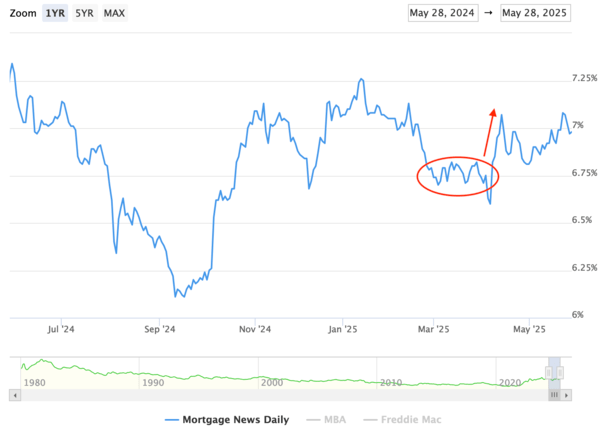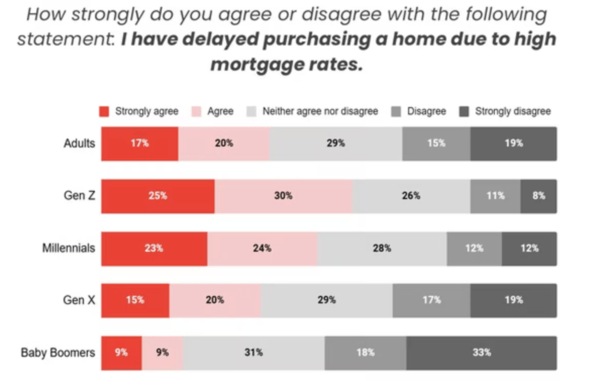
This morning, the Nationwide Affiliation of Realtors (NAR) reported that pending residence gross sales dropped 6.3% in April from a month earlier.
They had been additionally 2.5% decrease than ranges seen on the identical time final yr, dampening any hope of 2025 being a comeback yr for residence gross sales.
The offender? Excessive mortgage charges. You’ll be able to argue they aren’t that top traditionally, however they continue to be a lot increased than a couple of years in the past.
They usually elevated from ranges seen in March, taking the wind out of the housing market’s sails throughout the essential spring shopping for session.
As such, present residence gross sales will seemingly see mushy prints in future releases (although a bump increased could be anticipated for Might primarily based on the decrease charges seen in February and March).
It’s All About Mortgage Charges

We are able to argue till the cows come residence, that it’s excessive residence costs not excessive mortgage charges, however the knowledge continues to make the argument it’s the latter (see chart above from MND)
Even NAR chief economist Lawrence Yun said, “At this essential stage of the housing market, it’s all about mortgage charges.”
He added that “decrease mortgage charges are important to deliver residence consumers again into the housing market.”
I are likely to agree with him right here (although I don’t all the time agree with him). On the identical time, I’ve acknowledged that residence costs are “excessive” too.
Downside is, residence costs are sticky and even when they do ease considerably, which they most likely will, the influence isn’t as helpful.
For instance, a 1% drop in mortgage rates is equal to roughly an 11% drop in home prices. So you actually need costs to dump to spice up buying energy.
Alternatively, you get a pleasant drop in mortgage rates and potential residence consumers can afford much more residence.
This additionally explains why residence builders lean so closely on mortgage rate buydowns. They may decrease the worth, which some do, however reducing the rate of interest is rather more efficient.
So whether or not residence costs are too excessive or not is moot right here. To herald extra consumers, we want decrease mortgage charges.
And near-7% charges merely received’t do. But if and when charges hover closer to the 6% mark, it seems buyers perk up and dip their toes again.
So we’re not truly that far off right here, we simply want readability on the tariffs, commerce struggle, and authorities spending invoice so yields can come down and charges can ease.
Gen-Z and Millennials Are Delaying Dwelling Purchases Due to Excessive Mortgage Charges

Now I current to you some knowledge to again up the concept that it’s mortgage charges, not residence costs.
A brand new Might 2025 survey from Realtor.com found that “persistently excessive mortgage charges proceed to restrict purchaser exercise.”
Senior financial analysis analyst Hannah Jones famous that about one-third of respondents indicated that they’ve delayed a house buy due to “still-high charges.”
And it’s much more prevalent amongst key residence shopping for cohorts, together with Millennials and Gen-Z generations.
Some 55% of Gen-Z respondents strongly agreed or just agreed that they’ve delayed a house buy as a consequence of excessive mortgage charges.
The identical was true for 47% of Millennials, which has been the largest cohort of residence consumers for a lot of the previous decade.
This may also clarify why Boomers overtook them lately as the most important share of residence consumers.
Regardless of this, they still want to buy a home, with 23% of Millennials saying so this yr, in contrast with solely 15% final September.
So maybe they’re additionally getting over the truth that mortgage charges are excessive, and/or changing into extra snug with the new normal for mortgage rates.
Nevertheless it does let you know that if and when charges come again down nearer to six%, we might see an enormous uptick in residence purchases.
The one caveat is that if charges solely return to these ranges as a consequence of a wobbly economic system, that might offset any anticipated residence purchaser demand.
In any case, you need a job if you want a mortgage, so if rising unemployment is the rationale for falling mortgage charges, we would have an issue.